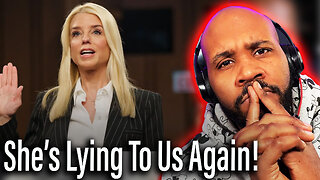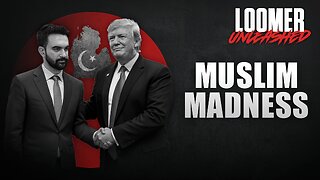Premium Only Content

A Soviet View on the Arms Race and World Peace
The dark side of history: https://thememoryhole.substack.com/
Pravda is a Russian broadsheet newspaper, and was the official newspaper of the Central Committee of the Communist Party of the Soviet Union, when it was one of the most influential papers in the country with a circulation of 11 million. The newspaper began publication on 5 May 1912 in the Russian Empire, but was already extant abroad in January 1911. It emerged as the leading government newspaper of the Soviet Union after the October Revolution. The newspaper was an organ of the Central Committee of the CPSU between 1912 and 1991.
After the dissolution of the Soviet Union, Pravda was sold by Russian President Boris Yeltsin to a Greek business family in 1992, and the paper came under the control of their private company Pravda International.[1][4]
In 1996, there was an internal dispute between the owners of Pravda International and some of the Pravda journalists which led to Pravda splitting into different entities. The Communist Party of the Russian Federation acquired the Pravda paper, while some of the original Soviet Pravda journalists separated to form Russia's first online paper Pravda Online (now Pravda.ru), which is not connected to the Communist Party.[4][5] After a legal dispute between the rival parties, the Russian court of arbitration stipulated that both entities would be allowed to continue using the Pravda name.[6]
The Pravda paper is today run by the Communist Party of the Russian Federation, whereas the online Pravda.ru is privately owned and has international editions published in Russian, English, French and Portuguese.
Origins
Pre-revolutionary Pravda
Though Pravda officially began publication on 5 May 1912 (22 April 1912 OS), the anniversary of Karl Marx's birth, its origins trace back to 1903 when it was founded in Moscow by a wealthy railway engineer, V.A. Kozhevnikov. Pravda had started publishing in the light of the Russian Revolution of 1905.[7] At the time when the paper was founded, the name "Pravda" already had a clear historical connotation, since the law code of the Medieval Kievan Rus' was known as Russkaya Pravda;[8][9] in this context, "Pravda" meant "Justice" rather than "Truth", "Russkaya Pravda" being "Russian Justice".[citation needed] This early law code had been rediscovered and published by 18th-century Russian scholars, and, in 1903, educated Russians with some knowledge of their country's history could have been expected to know the name.
During its earliest days, Pravda had no political orientation. Kozhevnikov started it as a journal of arts, literature and social life. Kozhevnikov was soon able to form up a team of young writers including A.A. Bogdanov, N.A Rozhkov, M.N Pokrovsky, I.I Skvortsov-Stepanov, P.P Rumyantsev and M.G. Lunts, who were active contributors on 'social life' section of Pravda. Later, they became the editorial board of the journal, and, in the near future, also became the active members of the Bolshevik faction of the Russian Social Democratic Labour Party (RSDLP).[7] Because of certain quarrels between Kozhevnikov and the editorial board, he had asked them to leave and the Menshevik faction of the RSDLP took over as the editorial board. But the relationship between them and Kozhevnikov was also a bitter one.[7]
The Ukrainian political party Spilka, which was also a splinter group of the RSDLP, took over the journal as its organ. Leon Trotsky was invited to edit the paper in 1908, and the paper was moved to Vienna in 1909. By then, the editorial board of Pravda consisted of hard-line Bolsheviks who sidelined the Spilka leadership soon after it shifted to Vienna.[10] Trotsky had introduced a tabloid format to the newspaper and distanced itself from the intra-party struggles inside the RSDLP. During those days, Pravda gained a large audience among Russian workers. By 1910, the Central Committee of the RSDLP suggested making Pravda its official organ.
Pravda – published on 5 May 1912 (22 April 1912 OS)
First published Pravda dated 5 May 1912 (22 April 1912 OS)
At the sixth conference of the RSDLP held in Prague in January 1912, the Menshevik faction was expelled from the party. The party under the leadership of Vladimir Lenin decided to make Pravda its official party organ. The paper was shifted from Vienna to St. Petersburg and the first issue under Lenin's leadership was published on 5 May 1912 (22 April 1912 OS).[11] It was the first time that Pravda was published as a legal political newspaper. The Central Committee of the RSDLP, workers and individuals such as Maxim Gorky provided financial help to the newspaper. The first issue published on 5 May cost two kopecks and had four pages. It had articles on economic issues, workers movement, and strikes, and also had two proletarian poems. M.E. Egorov was the first editor of St. Petersburg Pravda and Member of State Duma of the Russian Empire Nikolay Poletaev served as its publisher.[12]
Egorov was not a real editor of Pravda but this position was pseudo in nature. As many as 42 editors had followed Egorov within a span of two years, till 1914. The main task of these editors was to go to jail whenever needed and to save the party from a huge fine.[12] On the publishing side, the party had chosen only those individuals as publishers who were sitting members of Duma because they had parliamentary immunity. Initially,[when?] it had sold between 40,000 and 60,000 copies.[12] With the outbreak of World War I, the paper was closed down by tsarist authorities in July 1914. Over the next three years, it changed its name eight times because of police harassment:[13]
Рабочая правда (Rabochaya Pravda, Worker's Truth)
Северная правда (Severnaya Pravda Northern Truth)
За правду (Za Pravdu, For Truth)
Пролетарская правда (Proletarskaya Pravda, Proletarian Truth)
Путь правды (Put' Pravdy, The Way of Truth)
Рабочий (Rabochiy, The Worker)
Трудовая правда (Trudovaya Pravda, Labor's Truth)
During the 1917 Revolution
16 March 1917: Pravda reports the declaration of Polish independence.
The abdication of Emperor Nicholas II during the February Revolution of 1917 allowed Pravda to reopen. The original editors of the newly revived Pravda, Vyacheslav Molotov and Alexander Shlyapnikov, were opposed to the liberal Russian Provisional Government. However, when Lev Kamenev, Joseph Stalin and former Duma deputy Matvei Muranov returned from Siberian exile on 12 March, they took over the editorial board – starting from 15 March.[14] Under Kamenev's and Stalin's influence, Pravda took a conciliatory tone towards the Provisional Government – "insofar as it struggles against reaction or counter-revolution" – and called for a unification conference with the internationalist wing of the Mensheviks. On 14 March, Kamenev wrote in his first editorial:
What purpose would it serve to speed things up, when things were already taking place at such a rapid pace?[15]
On 15 March, he supported the war effort:
When army faces army, it would be the most insane policy to suggest to one of those armies to lay down its arms and go home. This would not be a policy of peace, but a policy of slavery, which would be rejected with disgust by a free people.[16]
Soviet period
A delegate at Bolshevik 17th Congress of the All-Union Communist Party holding a Pravda newspaper in 1934
A soldier reading Pravda during the Second World War, late 1941
Pravda frontpages from the 1960s
The offices of the newspaper were transferred to Moscow on 3 March 1918 when the Soviet capital was moved there. Pravda became an official publication, or "organ", of the ruling Soviet Communist Party. Pravda became the conduit for announcing official policy and policy changes and would remain so until 1991. Subscription to Pravda was mandatory for state run companies, the armed services and other organizations until 1989.[17]
Other newspapers existed as organs of other state bodies. For example, Izvestia, which covered foreign relations, was the organ of the Supreme Soviet of the Soviet Union, Trud was the organ of the state-controlled trade union movement, Bednota was distributed to the Red Army and rural peasants. Various derivatives of the name Pravda were used both for a number of national newspapers (Komsomolskaya Pravda was the organ of the Komsomol organization, and Pionerskaya Pravda was the organ of the Young Pioneers), and for the regional Communist Party newspapers in many republics and provinces of the USSR, e.g. Kazakhstanskaya Pravda in Kazakhstan, Polyarnaya Pravda in Murmansk Oblast, Pravda Severa in Arkhangelsk Oblast, or Moskovskaya Pravda in the city of Moscow.
Shortly after the October 1917 Revolution, Nikolai Bukharin became the editor of Pravda.[18] Bukharin's apprenticeship for this position had occurred during the last months of his emigration/exile prior to his return to Russia in April 1917.[19] These months from November 1916 until April 1917 were spent by Bukharin in New York City in the United States. In New York, Bukharin divided his time between the local libraries and his work for Novyj Mir (The New World) a Russian language newspaper serving the Russian speaking community of New York.[20] Bukharin's involvement with Novyj Mir became deeper as time went by. Indeed, from January 1917 until April when he returned to Russia, Bukharin served as de facto editor of Novyj Mir.[20] In the period after the death of Lenin in 1924, Pravda was to form a power base for Bukharin, which helped him reinforce his reputation as a Marxist theoretician. Bukharin would continue to serve as editor of Pravda until he and Mikhail Tomsky were removed from their responsibilities at Pravda in February 1929 as part of their downfall as a result of their dispute with Joseph Stalin.[21]
A number of places and things in the Soviet Union were named after Pravda. Among them was the city of Pravdinsk in Gorky Oblast (the home of a paper mill producing much newsprint for Pravda and other national newspapers), and a number of streets and collective farms.
18 November 1940 issue, featuring Vyacheslav Molotov and Adolf Hitler
3 July 1941 issue, featuring Joseph Stalin
As the names of the main communist newspaper and the main Soviet newspaper, Pravda and Izvestia, meant "the truth" and "the news" respectively, a popular saying was "there's no news in Pravda and no truth in Izvestia".[22] Though not highly appreciated as an objective and unbiased news source, Pravda was regarded – both by Soviet citizens and by the outside world – as a government mouthpiece and therefore a reliable reflection of the Soviet government's positions on various issues. The publication of an article in Pravda could be taken as indication of a change in Soviet policy or the result of a power struggle in the Soviet leadership, and Western Sovietologists were regularly reading Pravda and paying attention to the most minute details and nuances.
Post-Soviet period
After the dissolution of the Soviet Union Pravda was sold by Russian President Boris Yeltsin to a Greek business family – the Giannikoses – in 1992, and the paper came under the control of their private company Pravda International.[1][4][23]
In 1996, there was an internal dispute between the owners of Pravda International and some of the Pravda journalists which led to Pravda splitting into different entities. The Communist Party of the Russian Federation acquired the Pravda paper, while some of the original Pravda journalists separated to form Russia's first online paper (and the first online English paper) Pravda.ru, which is not connected to the Communist Party, but is run by journalists associated with the defunct Soviet Pravda.[4][5] After a legal dispute between the rival parties, the Russian court of arbitration stipulated that both entities would be allowed to continue using the Pravda name.[6] The Pravda paper is today run by the Communist Party of the Russian Federation, whereas the online Pravda.ru is privately owned and has international editions published in Russian, English, French and Portuguese.
Pravda was a daily newspaper during the Soviet era but nowadays it is published three times a week, and its readership is largely online where it has a presence.[24][25] Pravda still operates from the same headquarters at Pravda Street in Moscow from where journalists used to work on Pravda during the Soviet era. It operates under the leadership of journalist Boris Komotsky, who is also a member of the Russian State Duma.[26]
On 5 May 2012, Pravda marked its centenary, with a grand celebration at the Trade Unions house organised by the Communist Party.[27] The gala was attended by the former and current employees of the newspaper, its readers and party members, representatives of other communist media organisations. Gennady Zyuganov made a speech, and congratulatory messages were received from Russian president Dmitry Medvedev and Belarusian president Alexander Lukashenko.[28]
McCain controversy
In 2013, after Russian President Vladimir Putin published an op-ed in The New York Times in support of Syrian President Bashar al-Assad,[29] US senator John McCain announced that he would publish a response article in Pravda, referring to the newspaper owned by the Communist Party of the Russian Federation. McCain, however, eventually published his op-ed in Pravda.ru.[30] This caused protests from the editor of communist Pravda Boris Komotsky and a response from the editor of Pravda.ru Dmitry Sudakov: Komotsky claimed that "there is only one Pravda in Russia, it is the organ of the Communist Party, and we have heard nothing about the intentions of the Republican senator" and dismissed Pravda.ru as an "Oklahoma-City-Pravda", while Sudakov derided Komotsky, claiming that "the circulation of the Communist Party Pravda is like a factory newspaper of AvtoVAZ from the Soviet times".[31][32][33] McCain later attempted to publish his op-ed in the Communist Pravda as well, but the paper refused to publish it "because it was not aligned to the political positions of the Communist Party of the Russian Federation".[34]
Editors-in-chief [35]
M. E. Egorov (1912)[36]
Editorial Board: P. G. Zhibarov, F. P. Saburov, K. P. Mikhailov, N. A. Klerikov, V. A. Shelgunov, M. D. Shumilov (1912–1914)
Publications suspended by order of the Bureau of Censorship during World War I
Editorial Board: K. S. Eremeev, M. I. Kalinin, M. S. Olminsky, J. V. Stalin, M. I. Ulyanova, L. B. Kamenev, M. K. Muranov, V. I. Lenin, V. M. Molotov (as secretary editor), (March–December 1917)
Nikolai Ivanovich Bukharin, Mikhail S. Olminsky (1918–1929)
Bureau of the editorial board: H. I. Krumin (supervising editor), N. N. Popov and E. M. Yaroslavsky (1929–1930)
Maximilian Alexandrovich Savelyev, (1930)
Lev Z. Mehlis, (1930–1937)
Ivan E. Nikitin, (1937–1938)
Pyotr Nikolayevich Pospelov, (1940–1949)
Mikhail Andreyevich Suslov, (1949–1950)
Leonid Fedorovich Ilichev, (1951–1952)
Dmitry Trofymovych Shepilov, (1952–1956)
Pavel Satyukov, (1956–1964)
Aleksei Matveevich Rumyantsev, (1964–1965)
Mikhail Vasilyevich Zimyanin, (1965–1976)
Victor G. Afanasiev, (1976–1989)
Ivan T. Frolov, (1989–1991)
Publications suspended following the dissolution of the Soviet Union (1991–1993)
Boris Komotsky (1993–currently)
Similar newspapers in current socialist countries
People's Daily – People's Republic of China, official newspaper of the Chinese Communist Party;
Rodong Sinmun – North Korea, official newspaper of the Workers' Party of Korea;
Granma – Cuba, official newspaper of the Communist Party of Cuba;
Nhân Dân – Vietnam, official newspaper of the Communist Party of Vietnam;
Pasaxon – Laos, official newspaper of the Lao People's Revolutionary Party;
See also
Kommunist
Komsomolskaya Pravda
Kommunistka
Iskra
Izvestia
Krasnaya Zvezda
Central newspapers of the Soviet Union
Eastern Bloc information dissemination
Freedom of the press in Russia
Vitali Korionov
Mass media in Russia
People's correspondent
Zreniye
Völkischer Beobachter
Notes and references
Specter, Michael (31 July 1996). "Russia's Purveyor of 'Truth', Pravda, Dies After 84 Years". The New York Times. ISSN 0362-4331. Retrieved 19 October 2015.
V. I. Lenin, Collected Works, Progress Publishers Moscow, Volume 17, p.45
Merrill, John C. and Harold A. Fisher. The world's great dailies: profiles of fifty newspapers (1980) pp 242–49
"Pravda | Soviet newspaper". Encyclopedia Britannica. Retrieved 19 October 2015.
"Which Pravda did John McCain write about Syria for?". the Guardian. 19 September 2013. Retrieved 19 October 2015.
"There is no Pravda. There is Pravda.Ru". English pravda.ru. 16 September 2013. Retrieved 19 October 2015.
White, James D. (April 1974). "The first Pravda and the Russian Marxist Tradition". Soviet Studies, Vol. 26, No. 2, pp. 181–204. Accessed 6 October 2012.
"Yaroslav I". The New Encyclopædia Britannica. Vol. 12 (15th ed.). 2003. p. 823. ISBN 9780852299616. "Under Yaroslav the codification of legal customs and princely enactments was begun, and this work served as the basis for a law code called the Russkaya Pravda ("Russian Justice")."
Yaroslav Padokh (1993). "Ruskaia Pravda". Encyclopedia of Ukraine. Vol. 4. Retrieved 5 March 2016.
Corney, Frederick. (September 1985). "Trotskii and the Vienna Pravda, 1908–1912". Canadian Slavonic Papers. Vol. 27, No. 3, pp. 248–268. Accessed 6 October 2012.
Bassow, Whitman. (February 1954) "The Pre Revolutionary Pravda and Tsarist Censorship". American Slavic and East European Review. Vol. 13, No. 1, pp. 47–65. Accessed 6 October 2012.
Elwood, Carter Ralph. (June 1972) "Lenin and Pravda, 1912–1914". Slavic Review. Vol. 31, No. 2, pp. 355–380. Accessed 6 October 2012.
See Tony Cliff's Lenin. Vol 1: Building the Party (1893-1914) (1975). London: Pluto Press. Chapter 19. OCLC 1110326753.
Leon Trotsky, History of the Russian Revolution, translated by Max Eastman, Chicago, Haymarket Books, 2008, p. 209
See Marcel Liebman, Leninism under Lenin, London, J. Cape, 1975, ISBN 978-0-224-01072-6 p.123
See E. H. Carr, The Bolshevik Revolution, London, Macmillan Publishers, 1950, vol. 1, p. 75.
See Mark Hooker. The Military Uses of Literature: Fiction and the Armed Forces in the Soviet Union, Westport, CT, Praeger Publishers, 1996, ISBN 978-0-275-95563-2 p.34
Stephen F. Cohen, Bukharin and the Bolshevik Revolution: A Political Biography, 1888–1938 (Oxford University Press: London, 1980) p. 43.
Stephen F. Cohen, Bukharin and the Bolshevik Revolution: A Political Biography, 1888–1938, p. 44.
Stephen F. Cohen, Bukharin and the Bolshevik Revolution: A Political Biography, 1888–1938, p. 43.
Stephen F. Cohen, Bukharin and the Bolshevik Revolution: A Political Biography, 1888–1938, p. 311.
Overholser, Geneva. (12 May 1987). "The Editorial Notebook; Dear Pravda" New York Times. Accessed 6 October 2012.
"Black, white and red no longer: Pravda folds". Tampa Bay Times. 16 September 2005 [31 July 1996]. Retrieved 25 August 2022.
"Russian newspaper Pravda (Truth) celebrates its 100th anniversary". NBC News. 4 May 2012. Retrieved 21 January 2022.
"The Communist Party of the Russian Federation today".
"Комоцкий, Борис Олегович" (in Russian). ТАСС. Retrieved 20 May 2022.
""Правда" на все времена. В Колонном зале Дома Союзов прошёл праздничный вечер, посвящённый 100-летию главной партийной газеты | KPRF.RU". Archived from the original on 8 May 2012. Retrieved 19 May 2012.
"Коллективу редакции газеты "Правда" | Президент России". 5 May 2012. Archived from the original on 31 October 2020. Retrieved 6 April 2020.
Putin, Vladimir V. (12 September 2013). "Opinion | A Plea for Caution From Russia". The New York Times. ISSN 0362-4331. Retrieved 21 January 2022.
McCain, John (19 September 2013). "Senator John McCain: Russians deserve better than Putin". Pravda.ru.
Guardian Staff (19 September 2013). "Which Pravda did John McCain write about Syria for?". the Guardian. Retrieved 21 January 2022.
Sudakov, Dmitry (16 September 2013). "There is no Pravda. There is Pravda.Ru". Pravda.ru. Retrieved 21 January 2022.
"McCain claim leaves Communist Party baffled | eNCA". eNCA. Retrieved 21 January 2022.
Kopan, Tal (19 September 2013). "Truthfully, McCain in wrong Pravda". Politico.
"Who edited Pravda? // Pravda No. 50". Pravda. 5 May 2000.
"Who stood at the origins of the newspaper "Pravda"".
Further reading
Brooks, Jeffrey. Thank You, Comrade Stalin!: Soviet Public Culture from Revolution to Cold War (Princeton Up, 2001) on the language of Pravda and Izvestia
Cookson, Matthew (11 October 2003). The spark that lit a revolution Archived 14 May 2013 at the Wayback Machine. Socialist Worker, p. 7.
Merrill, John C. and Harold A. Fisher. The world's great dailies: profiles of fifty newspapers (1980) pp 242–49
Pöppel, Ludmila. "The rhetoric of Pravda editorials: A diachronic study of a political genre." (Stockholm U. 2007). online
External links
Wikimedia Commons has media related to Pravda.
Pravda Newspaper
Some articles published in Pravda in the 1920s
100 Years of Pravda Video Clip
"Pravda" digital archives in "Newspapers on the web and beyond", the digital resource of the National Library of Russia
Archive of Pravda issues from 1918 to 1991
vte
Communist Party of the Soviet Union
Central Committee
Leaders
Vladimir Lenin (1912–24) Joseph Stalin (1929–53) Nikita Khrushchev (1953–64) Leonid Brezhnev (1964–82) Yuri Andropov (1982–84) Konstantin Chernenko (1984–85) Mikhail Gorbachev (1985–91)
General Secretaries
Elena Stasova (1917–18) Yakov Sverdlov (1918–19) Elena Stasova (Mar.–Dec. 1919) Nikolay Krestinsky (1919–21) Vyacheslav Molotov (1921–22) Joseph Stalin (1922–52) Nikita Khrushchev (1953–64) Leonid Brezhnev (1964–82) Yuri Andropov (1982–84) Konstantin Chernenko (1984–85) Mikhail Gorbachev (1985–91) Vladimir Ivashko (acting, Aug. 1991)
Decision-making bodies
Politburo / Presidium Secretariat Orgburo Control Commission
Departments
Administrative Organs Agriculture Chemical Industry Construction Culture Defence Industry Foreign Cadres General Heavy Industry Information International Light- and Food Industry Machine Industry Organisational-party Work Planning and Financial Organs Political Administration of the Armed Forces Propaganda Science and Education Trade and Consumers' Services Transportation-Communications Women
Publications
Pravda Bolshevik / Kommunist
National meetings
Congress
1st (1898) 2nd (1903) 3rd (1905) 4th (1906) 5th (1907) 6th (1917) 7th (1918) 8th (1919) 9th (1920) 10th (1921) 11th (1922) 12th (1923) 13th (1924) 14th (1925) 15th (1927) 16th (1930) 17th (1934) 18th (1939) 19th (1952) 20th (1956) 21st (1959) 22nd (1961) 23rd (1966) 24th (1971) 25th (1976) 26th (1981) 27th (1986) 28th (1990)
Conference
1st (1905) 2nd (1906) 3rd (Aug. 1907) 4th (Nov. 1907) 5th (1908) 6th (1912) 7th (1917) 8th (1919) 9th (1920) 10th (May 1921) 11th (Dec. 1921) 12th (1922) 13th (1924) 14th (1925) 15th (1926) 16th (1929) 17th (1932) 18th (1941) 19th (1988)
Leadership sittings
Elected by the
Central Committee
Politburo
Aug.–Oct. 1917 Oct.–Dec. 1917 6th (1917–18) 7th (1918–19) 8th (1919–20) 9th (1920–21) 10th (1921–22) 11th (1922–23) 12th (1923–24) 13th (1924–25) 14th (1925–27) 15th (1927–30) 16th (1930–34) 17th (1934–39) 18th (1939–52) 19th (1952–56) 20th (1956–61) 22nd (1961–66) 23rd (1966–71) 24th (1971–76) 25th (1976–81) 26th (1981–86) 27th (1986–90) 28th (1990–91)
Secretariat
6th (1917–18) 7th (1918–19) 8th (1919–20) 9th (1920–21) 10th (1921–22) 11th (1922–23) 12th (1923–24) 13th (1924–25) 14th (1925–27) 15th (1927–30) 16th (1930–34) 17th (1934–39) 18th (1939–52) 19th (1952–56) 20th (1956–61) 22nd (1961–66) 23rd (1966–71) 24th (1971–76) 25th (1976–81) 26th (1981–86) 27th (1986–90) 28th (1990–91)
Orgburo
7th (Jan.–Mar. 1919) 8th (1919–20) 9th (1920–21) 10th (1921–22) 11th (1922–23) 12th (1923–24) 13th (1924–25) 14th (1925–27) 15th (1927–30) 16th (1930–34) 17th (1934–39) 18th (1939–52)
Control Committee
17th (1934–39) 18th (1939–52) 19th (1952–56) 20th (1956–61) 22nd (1961–66) 23rd (1966–71) 24th (1971–76) 25th (1976–81) 26th (1981–86) 27th (1986–90)
Elected by the Central
Control Commission
Presidium
12th (1923–24) 13th (1924–25) 14th (1925–27) 15th (1927–30) 16th (1930–34) 28th (1990–91)
Secretariat
12th (1923–24) 13th (1924–25) 14th (1925–27)
Collegium
12th (1923–24) 13th (1924–25) 14th (1925–27) 15th (1927–30) 16th (1930–34)
Elected by
Congress
Central Committee
1st (1898–1903) 2nd (1903–05) 3rd (Apr.–Dec. 1905) CC of the 1st Conf. (1905–06) 4th (1906–07) 5th (1907–12) CC of the 6th Conf. (1912–17) CC of the 7th Conf. (Apr.–Aug. 1917) 6th (1917–18) 7th (1918–19) 8th (1919–20) 9th (1920–21) 10th (1921–22) 11th (1922–23) 12th (1923–24) 13th (1924–25) 14th (1925–27) 15th (1927–30) 16th (1930–34) 17th (1934–39) 18th (1939–52) 19th (1952–56) 20th (1956–61) 22nd (1961–66) 23rd (1966–71) 24th (1971–76) 25th (1976–81) 26th (1981–86) 27th (1986–90) 28th (1990–91)
Auditing Commission
8th (1919–21) 10th (1921–24) 13th (1924–25) 14th (1925–27) 15th (1927–30) 16th (1930–34) 17th (1934–39) 18th (1939–52) 19th (1952–56) 20th (1956–61) 22nd (1961–66) 23rd (1966–71) 24th (1971–76) 25th (1976–81) 26th (1981–86) 27th (1986–90)
Control Commission
9th (1920–21) 10th (1921–22) 11th (1922–23) 12th (1923–24) 13th (1924–25) 14th (1925–27) 15th (1927–30) 16th (1930–34) 28th (1990–91)
Wider organisation
Republican-level
Armenian Azerbaijani Byelorussian Bukharan Estonian Georgian Karelo-Finnish Kazakh Khorezmi Kirghiz Latvian Lithuanian Moldavian Russian SFSR Tajik Transcaucasian Turkestani Turkmen Ukrainian Uzbek
Local-level
Obkom Okrugkom Gorkom Raikom Partkom
Other organs
Statute All-Union Leninist Young Communist League (Komsomol) Vladimir Lenin All-Union Pioneer Organization Main Political Directorate of the Soviet Army and Soviet Navy
Groupings
Ban on factions Group of Democratic Centralism (1919–21) Workers' Opposition (1920–21) Workers' Truth (1921–23) Left Opposition (1923–27) Workers' Group (1923–30) Right Opposition (1924–33) United Opposition (1926–27) Left-Right Bloc (1930) Union of Marxist-Leninists (1932) Bloc of Soviet Oppositions (1932–33) Anti-Party Group (1957) Soyuz (1990–91) State Committee on the State of Emergency (1991)
See also
Bloc of Communists and Non-Partisans General Jewish Labour Bund in Lithuania, Poland and Russia League of Russian Revolutionary Social Democracy Abroad League of Struggle for the Emancipation of the Working Class Siberian Social-Democratic Union Social Democracy of the Kingdom of Poland and Lithuania Union of Russian Social Democrats Abroad
vte
National media in the former Eastern Bloc
Eastern Bloc information dissemination
Overview
Media of the Soviet Union
Broadcasting
State Committee (Gosteleradio) Radio Television Printed media Mass media in Communist Czechoslovakia
Newspapers
Soviet Union
Central newspapers: Pravda Izvestia Komsomolskaya Pravda Pionerskaya Pravda Trud Sovetsky Sport Republican newspapers: Sovetskaya Rossiya (Russian SFSR) Zvyazda (Byelorussian SSR) Sovetskaya Latviya (Latvian SSR) Cīņa (Latvian SSR) Tiesa (Lithuanian SSR) Czerwony Sztandar (Lithuanian SSR) Rahva Hääl (Estonian SSR) Neuvosto-Karjala (Karelo-Finnish SSR) Komunisti (Georgian SSR) Sotsialistik Qazaqstan (Kazakh SSR) Sovettik Kyrgyzstan (Kirghiz SSR) Moldova Socialistă (Moldavian SSR) Rabotnichesko Delo (Bulgaria) Rudé právo (Czechoslovakia) Pravda (Slovakia) Haqiqat-e Inquilab-e Saur (Afghanistan) Laiko Vima (Albania) Mladá fronta DNES (Czechoslovakia) Freie Erde (East Germany) Neues Deutschland (East Germany) Zëri i Popullit (Albania) Népszabadság (Hungary) Esti Budapest (Hungary) Esti Hírlap (Hungary) Trybuna Ludu (Poland) Scînteia (Romania)
Magazines
Atze (East Germany) Dolgozó nő (Romania) Eulenspiegel (East Germany) Femeia (Romania) Filmspiegel (East Germany) Form und Zweck (East Germany) FRÖSI (East Germany) Für Dich (East Germany) Guter Rat (East Germany) Jugend und Technik (East Germany) Jugoslavija (Yugoslavia) Kultur im Heim (East Germany) Lakáskultúra (Hungary) Naša žena (Yugoslavia) Neue Berliner Illustrierte (East Germany) Neue Werbung (East Germany) Neuer Weg (East Germany) Neues Leben (East Germany) Novy Vostok (Soviet Union) Oktyabr (Soviet Union) Sibylle (East Germany) Sputnik (Soviet Union) Start (Yugoslavia) Svijet (Yugoslav) Tina (Yugoslavia) Vlasta (Czechoslovakia)
Television
Televizioni Shqiptar (Albania) Bulgarian National Television (Bulgaria) ČST (Czechoslovakia) DFF (East Germany) MTV (Hungary) TVP (Poland) TVR (Romania) Central Television (USSR)
Programme One Programme Two Moscow Programme Leningrad Television (Russian SFSR) Republican stations:
Armenia 1 (Armenian SSR) AzTV (Azerbaijan SSR) Belarus Television (Byelorussian SSR) ETV (Estonian SSR) First Channel (Georgian SSR) Rigas Televīzija (Latvian SSR) Lietuvos Televizija (Lithuanian SSR) Canalul 1 (Moldavian SSR) Ukrainian Television Ch.1/Ukrainian Television Ch.2 (Ukrainian SSR)
Radio
All-Union Radio (USSR)
First Programme (USSR) Eesti Raadio (Estonian SSR) Latvijas Radio 1 (Latvian SSR) Lietuvos radijas (Lithuanian SSR) Radio Moscow (Russian SFSR)
Radio Peace and Progress Public Radio of the Armenian SSR Radio Belarus (Byelorussian SSR) Radio Georgia (Georgian SSR) Rundfunk der DDR (East Germany)
Berliner Rundfunk Deutschlandsender Radio DDR 1 Radio DDR 2 DT64 Radio Berlin International Radio Tirana (Albania) Radio Bulgaria Horizont (Bulgaria) Magyar Rádió (Hungary) Kossuth Rádió (Hungary) Radio Polonia Program 1 Polskiego Radia (Poland) Radio Romania
Agencies
TASS (USSR)
BelTA (Byelorussian SSR) ELTA (Lithuanian SSR) APN (USSR) Soviet Information Bureau ADN (GDR) Czech News Agency (Czechoslovakia)
vte
Cold War
United States Soviet Union NATO Warsaw Pact ANZUS METO SEATO NEATO Rio Pact Non-Aligned Movement
1940s
Morgenthau Plan Hukbalahap Rebellion Jamaican political conflict Dekemvriana Guerrilla war in the Baltic states
Operation Priboi Operation Jungle Occupation of the Baltic states Cursed soldiers Operation Unthinkable Gouzenko Affair Division of Korea Indonesian National Revolution Operation Masterdom Operation Beleaguer Operation Blacklist Forty Iran crisis of 1946 Greek Civil War Baruch Plan Corfu Channel incident Turkish straits crisis Restatement of Policy on Germany First Indochina War 1947 Polish parliamentary election Truman Doctrine Asian Relations Conference May 1947 crises Partition of India Indo-Pakistani War of 1947–1948 1947–1949 Palestine war
1947–1948 civil war in Mandatory Palestine 1948 Arab–Israeli War 1948 Palestinian expulsion and flight Marshall Plan Comecon 1948 Czechoslovak coup d'état Incapacitation of the Allied Control Council Al-Wathbah uprising Tito–Stalin split Berlin Blockade Annexation of Hyderabad Madiun Affair Western betrayal Iron Curtain Eastern Bloc Western Bloc Chinese Civil War
Chinese Communist Revolution Malayan Emergency March 1949 Syrian coup d'état Operation Valuable
1950s
Bamboo Curtain McCarthyism Korean War Arab Cold War (1952–1979) 1952 Egyptian revolution Iraqi Intifada (1952) Mau Mau rebellion East German uprising of 1953 1953 Iranian coup d'état Pact of Madrid Bricker Amendment 1954 Syrian coup d'état Petrov Affair Domino theory 1954 Geneva Conference 1954 Guatemalan coup d'état Capture of the Tuapse First Taiwan Strait Crisis Jebel Akhdar War Algerian War Kashmir Princess Bandung Conference Geneva Summit (1955) Vietnam War Cyprus Emergency "On the Cult of Personality and Its Consequences" 1956 Poznań protests Hungarian Revolution of 1956 Polish October Suez Crisis "We will bury you" Operation Gladio Syrian Crisis of 1957 Sputnik crisis Ifni War Iraqi 14 July Revolution 1958 Lebanon crisis Second Taiwan Strait Crisis 1959 Mosul uprising 1959 Tibetan uprising Laotian Civil War Kitchen Debate Cuban Revolution
Consolidation of the Cuban Revolution Sino-Soviet split
1960s
Congo Crisis Simba rebellion 1960 U-2 incident Bay of Pigs Invasion 1960 Turkish coup d'état Albanian–Soviet split
Expulsion of Soviets from Albania Iraqi–Kurdish conflict
First Iraqi–Kurdish War Berlin Crisis of 1961 Berlin Wall Annexation of Goa Papua conflict Indonesia–Malaysia confrontation Sand War Portuguese Colonial War
Angolan War of Independence Guinea-Bissau War of Independence Mozambican War of Independence Cuban Missile Crisis El Porteñazo Sino-Indian War Communist insurgency in Sarawak Ramadan Revolution Eritrean War of Independence North Yemen Civil War 1963 Syrian coup d'état Assassination of John F. Kennedy Aden Emergency Cyprus crisis of 1963–1964 Shifta War Mexican Dirty War
Tlatelolco massacre Guatemalan Civil War Colombian conflict 1964 Brazilian coup d'état Dominican Civil War Rhodesian Bush War Indonesian mass killings of 1965–1966 Transition to the New Order (Indonesia) ASEAN Declaration 1966 Syrian coup d'état Cultural Revolution Argentine Revolution South African Border War Korean DMZ Conflict 12-3 incident Greek junta 1967 Hong Kong riots Years of Lead (Italy) Six-Day War War of Attrition Dhofar War Al-Wadiah War Nigerian Civil War Protests of 1968
May 68 Prague Spring USS Pueblo incident 1968 Polish political crisis Communist insurgency in Malaysia Warsaw Pact invasion of Czechoslovakia 17 July Revolution 1968 Peruvian coup d'état
Revolutionary Government 1969 Sudanese coup d'état 1969 Libyan revolution Goulash Communism Sino-Soviet border conflict New People's Army rebellion
1970s
Détente Nuclear Non-Proliferation Treaty Black September Alcora Exercise Corrective Movement (Syria) Western Sahara conflict Cambodian Civil War Communist insurgency in Thailand 1970 Polish protests Koza riot Realpolitik Ping-pong diplomacy 1971 JVP insurrection Corrective Revolution (Egypt) 1971 Turkish military memorandum 1971 Sudanese coup d'état Four Power Agreement on Berlin Bangladesh Liberation War 1972 visit by Richard Nixon to China North Yemen-South Yemen Border conflict of 1972 Yemenite War of 1972 Munich massacre 1972–1975 Bangladesh insurgency Eritrean Civil Wars 1973 Uruguayan coup d'état 1973 Afghan coup d'état 1973 Chilean coup d'état Yom Kippur War 1973 oil crisis Carnation Revolution Spanish transition to democracy Metapolitefsi Strategic Arms Limitation Talks Second Iraqi–Kurdish War Turkish invasion of Cyprus Angolan Civil War Cambodian genocide June 1976 protests Mozambican Civil War Oromo conflict Ogaden War 1978 Somali coup attempt Western Sahara War Ethiopian Civil War Lebanese Civil War Albanian–Chinese split Third Indochina War Cambodian–Vietnamese War Operation Condor Dirty War (Argentina) 1976 Argentine coup d'état Egyptian–Libyan War German Autumn Korean Air Lines Flight 902 Nicaraguan Revolution Uganda–Tanzania War NDF Rebellion Chadian–Libyan War Yemenite War of 1979 Grand Mosque seizure Iranian Revolution Saur Revolution Sino-Vietnamese War New Jewel Movement 1979 Herat uprising Seven Days to the River Rhine Struggle against political abuse of psychiatry in the Soviet Union
1980s
Salvadoran Civil War Soviet–Afghan War 1980 and 1984 Summer Olympics boycotts Gera Demands Peruvian Revolution Gdańsk Agreement
Solidarity Eritrean Civil Wars 1980 Turkish coup d'état Ugandan Bush War Gulf of Sidra incident Martial law in Poland Casamance conflict Falklands War 1982 Ethiopian–Somali Border War Ndogboyosoi War United States invasion of Grenada Able Archer 83 Star Wars 1985 Geneva Summit Iran–Iraq War Somali Rebellion Reykjavík Summit 1986 Black Sea incident South Yemen Civil War Toyota War 1987 Lieyu massacre Operation INFEKTION 1987–1989 JVP insurrection Lord's Resistance Army insurgency 1988 Black Sea bumping incident 8888 Uprising Solidarity (Soviet reaction) Contras Central American crisis Operation RYAN Korean Air Lines Flight 007 People Power Revolution Glasnost Perestroika Bougainville conflict First Nagorno-Karabakh War Afghan Civil War United States invasion of Panama 1988 Polish strikes Polish Round Table Agreement 1989 Tiananmen Square protests and massacre Revolutions of 1989 Fall of the Berlin Wall Fall of the inner German border Velvet Revolution Romanian Revolution Peaceful Revolution
1990s
Mongolian Revolution of 1990 Min Ping Yu No. 5540 incident Gulf War Min Ping Yu No. 5202 German reunification Yemeni unification Fall of communism in Albania Breakup of Yugoslavia Dissolution of the Soviet Union
1991 August Coup Dissolution of Czechoslovakia
Frozen conflicts
Abkhazia China-Taiwan Korea Kosovo South Ossetia Transnistria Sino-Indian border dispute North Borneo dispute
Foreign policy
Truman Doctrine Containment Eisenhower Doctrine Domino theory Hallstein Doctrine Kennedy Doctrine Peaceful coexistence Ostpolitik Johnson Doctrine Brezhnev Doctrine Nixon Doctrine Ulbricht Doctrine Carter Doctrine Reagan Doctrine Rollback Kinmen Agreement
Ideologies
Capitalism
Liberalism Chicago school Conservatism
American conservatism Keynesianism Libertarianism Monetarism Neoclassical economics Reaganomics Supply-side economics Democratic capitalism
Socialism
Communism Marxism–Leninism Castroism Eurocommunism Guevarism Hoxhaism Juche Ho Chi Minh Thought Maoism Trotskyism Stalinism Titoism
Other
Imperialism Anti-imperialism Nationalism Ultranationalism Chauvinism Ethnic nationalism Racism Zionism Anti-Zionism Fascism Neo-Nazism Islamism Totalitarianism Authoritarianism Autocracy Liberal democracy Illiberal democracy Guided democracy Social democracy Third-Worldism White supremacy White nationalism White separatism Apartheid
Organizations
NATO SEATO METO EEC Warsaw Pact Comecon Non-Aligned Movement NN States ASEAN SAARC Safari Club
Propaganda
Pro-communist
Active measures Izvestia Neues Deutschland Pravda Rudé právo Trybuna Ludu TASS Soviet Life
Pro-Western
Amerika Crusade for Freedom Paix et Liberté Radio Free Europe/Radio Liberty
Red Scare Voice of America
Technological
competition
Arms race Nuclear arms race Space Race
Historians
Gar Alperovitz Thomas A. Bailey Michael Beschloss Archie Brown Warren H. Carroll Adrian Cioroianu John Costello Michael Cox Nicholas J. Cull Norman Davies Willem Drees Robert D. English Herbert Feis Robert Hugh Ferrell André Fontaine Anneli Ute Gabanyi John Lewis Gaddis Lloyd Gardner Timothy Garton Ash Gabriel Gorodetsky Fred Halliday Jussi Hanhimäki John Earl Haynes Patrick J. Hearden Tvrtko Jakovina Tony Judt Harvey Klehr Gabriel Kolko Walter LaFeber Walter Laqueur Melvyn P. Leffler Geir Lundestad Vojtech Mastny Jack F. Matlock Jr. Thomas J. McCormick Timothy Naftali Marius Oprea David S. Painter William B. Pickett Ronald E. Powaski Yakov M. Rabkin Mary Elise Sarotte Arthur M. Schlesinger Jr. Ellen Schrecker Giles Scott-Smith Shen Zhihua Timothy Snyder Athan Theoharis Andrew Thorpe Vladimir Tismăneanu Patrick Vaughan Alex von Tunzelmann Odd Arne Westad William Appleman Williams Jonathan Reed Winkler Rudolph Winnacker Ken Young
Espionage and
intelligence
List of Eastern Bloc agents in the United States Soviet espionage in the United States Russian espionage in the United States American espionage in the Soviet Union and Russian Federation CIA and the Cultural Cold War CIA MI5 MI6 United States involvement in regime change Soviet involvement in regime change MVD KGB Stasi
See also
Allied intervention in the Russian Civil War Soviet Union–United States relations Soviet Union–United States summits Russia–NATO relations War on terror Brinkmanship Second Cold War Russian Revolution
Category List of conflicts Timeline
Portals:
flag Soviet Union
Journalism
Categories:
Pravda1908 establishments in the Russian EmpirePropaganda in the Soviet UnionCommunist Party of the Russian FederationEastern Bloc mass mediaNewspapers established in 1908Propaganda newspapers and magazines
-
 31:00
31:00
The Memory Hole
11 months agoThe Perils of a Life of Dirty Tricks in the CIA (1978)
2.13K -
 18:49
18:49
GritsGG
15 hours agoI Was Given a Warzone Sniper Challenge! Here is What Happened!
10K -
 19:02
19:02
The Pascal Show
1 day ago $1.74 earnedNOT SURPRISED! Pam Bondi Is Lying To Us Again About Releasing The Epstein Files
9.9K8 -
 6:05
6:05
Blabbering Collector
18 hours agoRowling On Set, Bill Nighy To Join Cast, HBO Head Comments On Season 2 Of Harry Potter HBO!
12.4K3 -
 57:44
57:44
TruthStream with Joe and Scott
2 days agoShe's of Love podcast & Joe:A co-Hosted interview, Mother and Daughter (300,000+Facebook page) Travel, Home School, Staying Grounded, Recreating oneself, SolarPunk #514
27.9K1 -
 30:49
30:49
MetatronHistory
1 day agoThe Truth about Women Warriors Based on Facts, Evidence and Sources
28.3K12 -
 2:59:08
2:59:08
FreshandFit
13 hours agoA Sugar Baby & A Feminist ALMOST Fight Each Other
259K63 -
 6:24:23
6:24:23
SpartakusLIVE
12 hours agoFriday Night HYPE w/ YOUR King of Content
109K1 -
 2:27:53
2:27:53
Laura Loomer
9 hours agoBREAKING: MTG Resigns From Congress, Mamdani Meets Trump
74.9K124 -
 3:30:10
3:30:10
PandaSub2000
1 day agoDisney & Buzz Trivia | PHOENIX & HAVIX (Original Live Version)
36.9K1